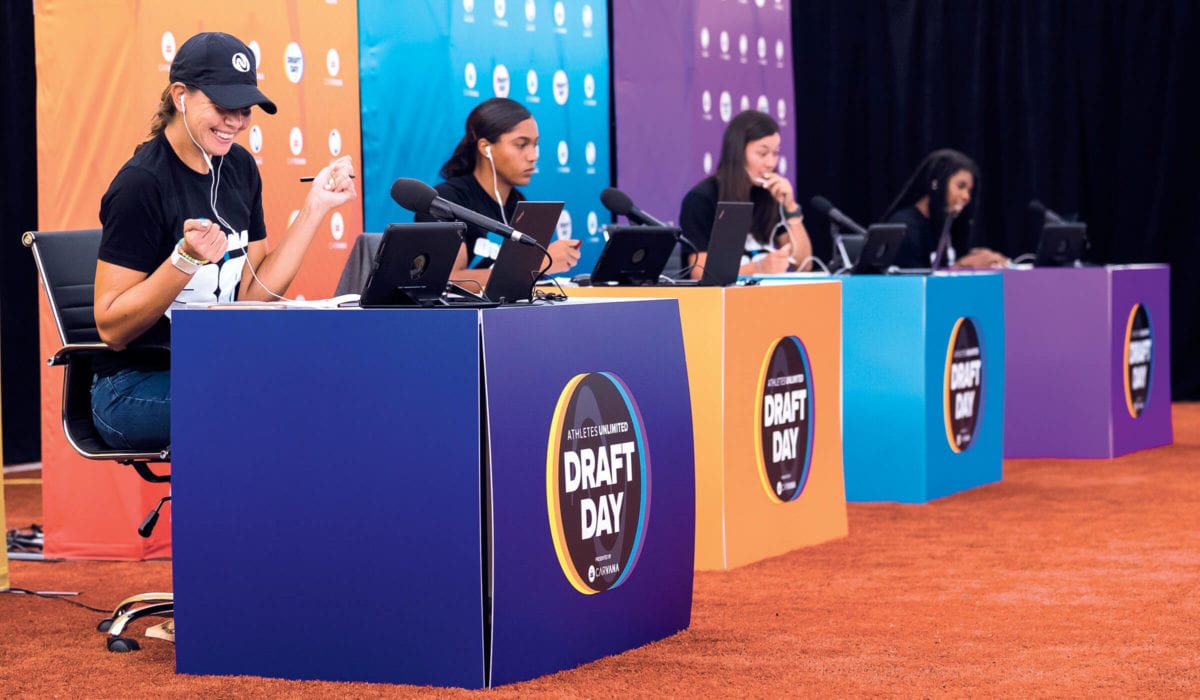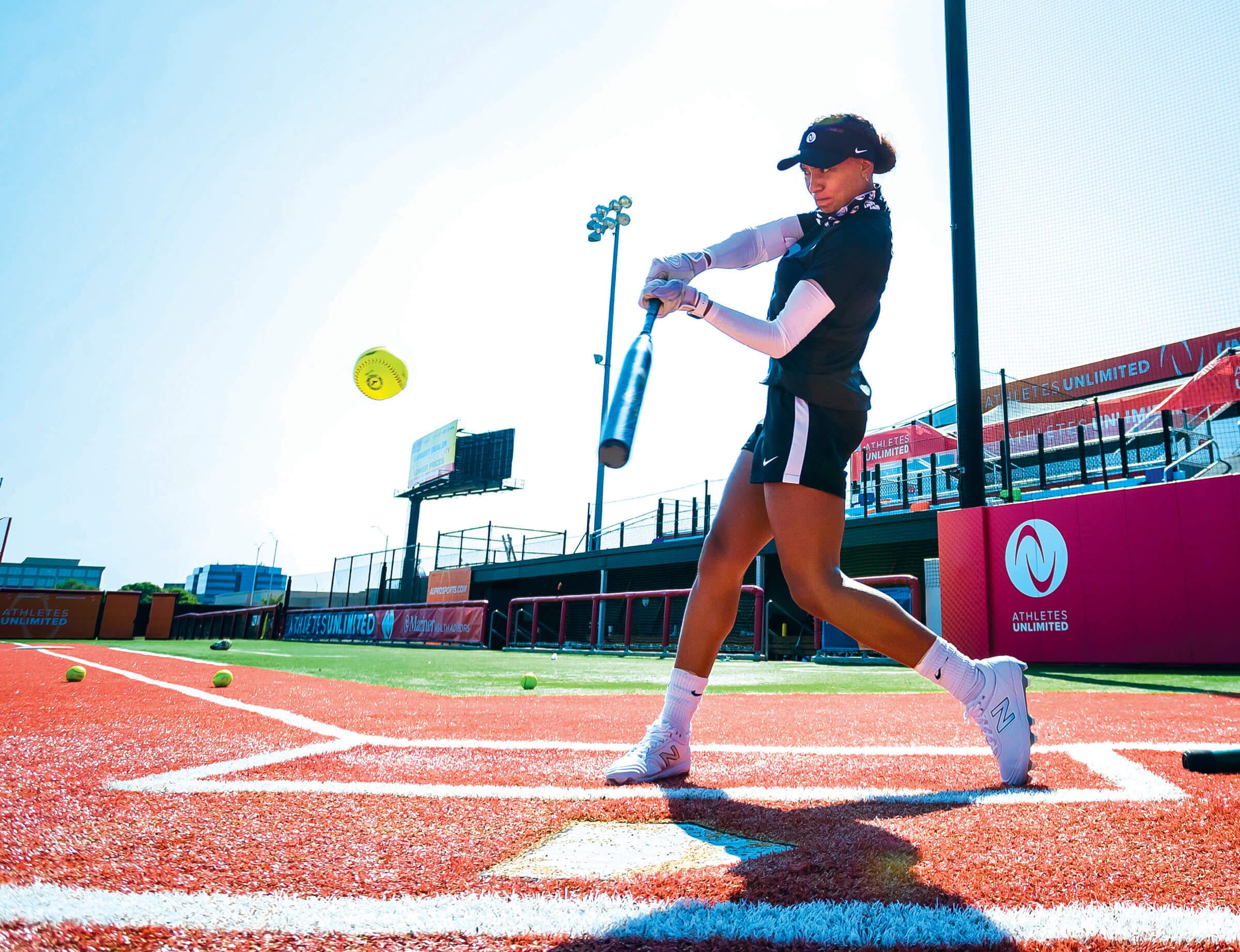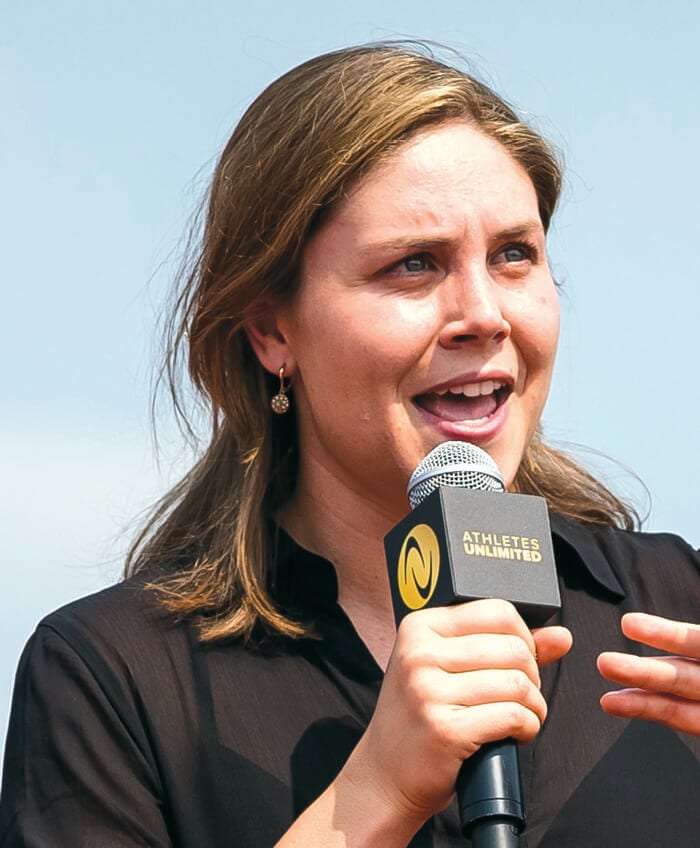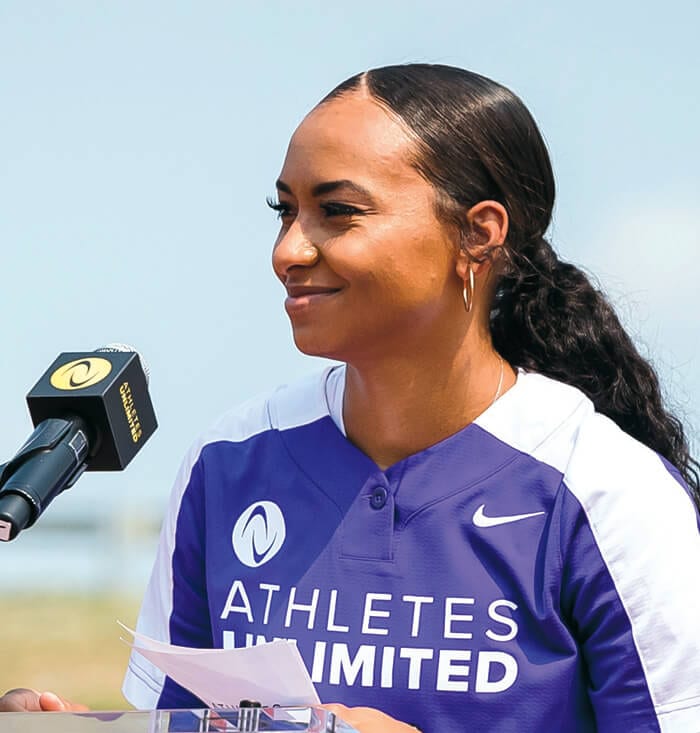Jazmyn Jackson and Asha Culhane-Husain, both BS 18, help new pro softball league change up competitive sports
Imagine questioning the status quo where pro sports are concerned. What if there were no actual teams or city affiliations? What if, instead of general managers or coaches, the players called all the shots? What if the national anthem were replaced by something else?
Such is the model for Athletes Unlimited, a new network of professional sports leagues—currently softball, indoor volleyball, and lacrosse—that’s reinventing women’s pro sports.
When Jazmyn Jackson, BS 18, a star for the Cal softball team and former member of the U.S. women’s national team, first heard about Athletes Unlimited, she was skeptical. The endeavor, created by Jonathan Soros and Jon Patricof, resembles a real-life fantasy league, with a weekly draft and players earning points based on their in-game stats: hits, stolen bases, strikeouts, and the like and whether they’re named a most valuable player at game’s end.
“I was thinking, I’m a traditional softball player, what is this?” says Jackson, an outfielder who helped Team USA win gold at the 2016 World Championship. “I don’t want to do it like this. I’m all about the team stats. But now being here, I’ve never played a more team-oriented game, because winning every inning and winning the game gets you so many points.”
And points equal money. The base pay with Athletes Unlimited is $10,000 for a six-week season, with bonuses of $1,000 to $15,000, depending on performance. The money comes from fan memberships and corporate sponsors. By contrast, in a typical pro league, women softball players earn about $5,000 a summer—$10,000 if they’re lucky, Jackson says. In her offseason, Jackson had to hustle to make ends meet, teaching lessons, clinics, or camps. “It made me realize how badly women’s sports needs recognition, pay, equity—all of these things.”

The business of blazing trails
Once Jackson was convinced to try the Athletes Unlimited business model, she went all in to make it the best league possible. As a part of the inaugural season, Jackson gets a share in the company. She’s also a member of the five-person player executive committee (PEC) and the racial equity working group. The PEC establishes the rules of the game and the guidelines for player conduct, as well as sets COVID-19 standards and procedures.
“With my business degree, I feel like I have the perfect background to make this happen,” says Jackson. “Being trailblazers is what Berkeley Haas is all about. And I feel like this is what my degree was supposed to be for.”
She’s leaning on her studies in marketing, as the Athletes Unlimited business model differs from other leagues in that regard. “We are advertised as a bunch of different personalities coming together to play this game instead of one team. You might be a huge fan of the Oakland Athletics, say, but you know nobody on the team,” says Jackson. “But the way Athletes Unlimited does their marketing is that they’re advertising our personalities, our stories.” Jackson, for example, is active in social justice issues, and the league highlights those efforts.
And because the league is player driven and player owned, the athletes are free to express their beliefs. “It’s nice because I am not representative of the whole Athletes Unlimited,” says Jackson. “It’s not like the NBA putting out a statement on a certain issue. It’s Jazmyn Jackson’s stance on an issue.”

Jackson’s interest in social justice led her to the league’s racial equity working group, which formulated 45 recommendations for internal policies and procedures as well as external initiatives to promote diversity and inclusion, like involving historically Black colleges and universities in recruitment efforts, working with local nonprofits to bring inner-city children to games, and making sure vendors represent a variety of backgrounds.
Rethinking the national anthem
They also discussed the national anthem. Did the players want to stand or kneel? Did they want to raise their fists up to support people of color? Since it’s a new league, co-founder Soros proposed doing something completely different, a suggestion that initially took Jackson aback.
“As an athlete, the anthem is what always gets you in the game, ready to go. Whether you’re kneeling, whether you’re standing, the national anthem means something,” says Jackson, who is African American and Mexican. “When I heard the national anthem, it was an ode to how I got to stand with my peers in an integrated league and represent the color of my skin and my family at the highest level. That was huge for me, especially when I was on Team USA.”
But she took the idea to replace the national anthem to heart. Having just seen an ESPNW video celebrating the 48th anniversary of Title IX, Jackson immediately envisioned a video and spoken-word piece showcasing the athletes’ accomplishments. She thought of something that told the stories of all the players, accurately representing what they’ve endured, the sacrifices they’ve made to play the sport they love, and what it takes for the top 1% of softball players in the world just to make a living.

And Jackson knew who would be the best person to articulate such a vision: Former classmate and friend Asha Culhane-Husain, BS 18. The pair met at Haas and travelled in the same circles as student-athletes. Culhane-Husain was a member of the track and field team, competing in the heptathlon.
She also minored in theater, dance, and performance studies and studied abroad at the respected Gaiety School of Acting, Ireland’s national theater school. She’s now enrolled at the Conservatoire National Supérieur d’Art Dramatique, France’s National Academy of Dramatic Arts (like the Juilliard of France, says Culhane-Husain).
The first time Jackson heard Culhane-Husain speak publicly was at a student-athlete professional development event where she delivered a speech about female empowerment that moved Jackson to tears. The next time was at Haas’ graduation, when Culhane-Husain, the student speaker, mentioned a number of classmates in her speech, including Jackson, honoring her ability to graduate from a prestigious school while also representing Cal and the United States on the softball field.
“Asha is just an amazing artist, and I wanted her to be a part of this,” says Jackson. “I know how inspired I felt from her. That’s exactly what I envisioned for the piece.”
Jackson suggested Culhane-Husain to the racial equity working group and the league founders. They liked the idea, and after a selection process, Culhane-Husain began interviewing every softball, volleyball, and lacrosse player in Athletes United, asking them to share their experiences as women and athletes.
Channeling emotion
Culhane-Husain’s job was not an easy one: Convey the experiences of these athletes in an inspiring spoken-word piece short enough to be played before every game and do it in only two weeks.
“I told them, ‘You have a blank slate. I’m here to listen to whatever you want to express to the world. Feel free to be excited, be passionate, be angry, be happy. Be selfish with the space.’ And they were,” Culhane-Husain says. “They were willing to be vulnerable with me and share their stories. It was a humbling experience that they trusted me with all of those personal details.”
With full creative liberty from Athletes United, Culhane-Husain then set about crafting a piece that uplifted the athletes’ voices. “Part of what we learn in acting school is to approach, emotionally, the experience of another human,” she says. “I tried to enter into their emotions with them and channel that into words.”

The result was a five-minute piece Culhane-Husain debuted at the opening ceremonies for Athletes Unlimited (shown above) in front of all of the players. It was presented in concert with the national anthems of every country with competitors in the league. She also created 90- and 45-second versions, which have been turned into videos to be played before every Athletes Unlimited contest, both locally and on TV (the games are broadcast on CBS Sports Network and ESPN), replacing the national anthem.

For Jackson and the other players, Culhane-Husain’s work hit all the right notes. Jackson cried the first time she heard it and remembers thinking it wouldn’t have the same effect later, but she found that it does. “She made it personal to us and made us feel heard and represented,” Jackson says. “She didn’t say any names, but it was all of our stories. Feeling so represented but also so one with the group around you—I’ve never felt that during the national anthem the way I feel with this piece.”
Culhane-Husain says the athletes’ stories have stuck with her, especially the grit, determination, and tenacity shared by the women. “Now those stories are with me, and they inform all of my other artistic processes too,” she says. She’s proud that her creation will be played before every game, offering a continual platform for the athletes to reflect their lived experiences.
“If you love something, you want to make it better,” Culhane-Husain says. “I think that was the point behind this.”
In other words, questioning the status quo and trying to empower others. Just like Berkeley Haas taught them.
Experience Culhane-Husain’s creation.
A version of this article first appeared on the Cal Athletics website.
